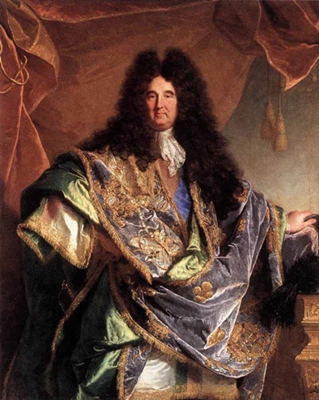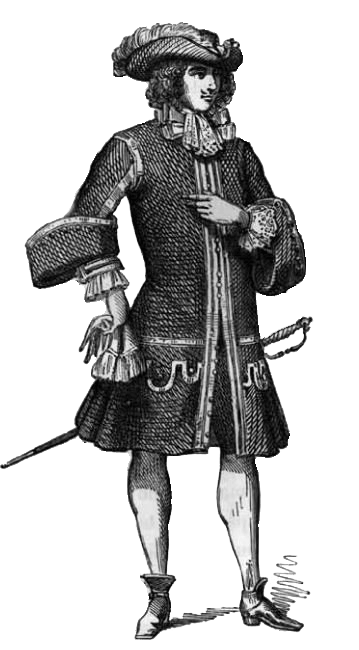Dangeau’s Diary, September 1688

3d. — This evening Monsieur de Vardes died at Paris. He was a knight of the Order, and had held a captaincy in the hundred Swiss.
12th. — Madame de Bouillon, at present in England, has asked the King’s permission, through Monsieur de Seignelay, to go to Venice. The King answered, that she might go wherever she pleased, except to court and to Paris.
14th. — Chanlai has returned from Rome, whither he had been sent by the King, as the bearer of a letter to the Pope, written with his Majesty’s own hand. He could never obtain an audience, although he applied to Cardinal Cibo and at last made him self known to Cardinal Estrees, in order to be admitted to an audience through his means.
16th. — Lord Spencer, eldest son of the earl of Sunderland, prime minister of England, died this evening at Paris, from having drunk too plentifully of brandy.
18th. — News has been received from Rome, that Monsieur de Lavardin had sent a gentleman to Monsieur de Bracciano to tell him, that since he had chosen to desert the French party, he ought to remove the arms of France from off the gate of his palace, which he did the same day and the next he went to the Pope, to beg he would absolve him from the excommunication which he had incurred by the correspondence he had had with Monsieur de Lavardin. The Pope told him that he had embraced the right side and that he might rely upon his favour. Two days after, Monsieur de Lavardin sent him word that he had only to repent of having failed in duty to the King and of falsifying the oath he had taken upon receiving the Order of the Holy Ghost, an order which he was now unworthy of wearing, and which he desired him to return. Monsieur de Bracciano had left it off the very day he had removed the arms from his palace gates.
20th. — The Comte de la Tour, envoy of the Elector of Bavaria, arrived, booted and spurred, to inform the Dauphine of what had occurred the 6th of this month, at the taking of Belgrade. The Elector was wounded in the cheek, by an arrow, while he was standing in the breach. Monsieur de Commercy received a musket-ball below the knee, the ball entered the flesh, and has not yet been found. Young Staremberg, son of the governor of Vienna, count Emanuel de Furstemberg, and several other persons of distinction, have been killed. The King entered the apartment of the Dauphine, while La Tour was there, and said to him, that although he had already learnt what had taken place at Belgrade, yet he received so much pleasure in hearing an action spoken of, in which the Elector of Bavaria had acquired so much glory, that he begged him to recommence the recital of the circumstance.
22d. — The King told the Dauphine that he was about to send Monseigneur to take the command of his armies in Germany. She burst into tears and replied, that although she was very much afflicted at the departure of Monseigneur, yet that she thanked his Majesty for the opportunity he afforded him of acquiring glory. The King said to Monseigneur: “In sending you to command my armies, I afford you opportunities of manifesting your merit: go, display it to all Europe, in order that when I die, it may not be perceived that the King is dead“.
23d. — We only learnt yesterday at the coucher, that the King had announced that Monseigneur should set off next Saturday, to command an army intended to operate on the banks of the Rhine. Marshal Duras will be next in command to Monseigneur. There, will be six lieutenants-general: Montclar, Joyeuse, d’Euxelles, the Chevalier de Tilladet, and Rubantel. Monseigneur will have for aides-de-camp, six of his menins, Sainte Maure, Mailly, Thiange, Dantin, and Quelus; and four others, namely, Comte de Crussol, Comte de Guiche, Comte de Mornay, and Monsieur d’Heudicourt. In this journey, Monsieur de Montchevreuil will accompany Monsieur du Maine, who will no longer have any preceptor: Jussac, who filled that office, will have the title of first gentleman of the chamber. Upon Monseigneur’s return from his journey to Chantilly, the King had confided to him his intention, a secret which he has kept with the greatest fidelity.
25th. — Monseigneur has left Versailles, to sleep at Meaux. Monsieur le Duc, the Prince de Conti, and Monsieur du Maine, accompany him. We have seen the manifesto issued by the King upon the subject of his troops entering Germany, by the taking of Philipsbourg and of Kaisers Lautern. We have also seen the letter which the King has written to the cardinal d’Estrees, upon all the subjects of complaint to which the Pope has given rise. All the young gentry have asked the King’s permission to accompany Monseigneur, even those who have regiments. The King has allowed most of them, but has refused others such as Nangis, Lasse, Duc de La Ferté, the Comte de Soissons, and Prince Philip. The King and Monseigneur were much afflicted at parting. His Majesty gave him seven thousand pistoles, and some diamonds, for presents.
27th. — We have learnt that the King, a short time ago, sent Monsieur de Lavardin a present of ten thousand livres. He has received several such presents since his residence at Rome. Yesterday there was an extraordinary sitting of parliament, in which the attorney-general appealed to the future council from all that the Pope had done in the affair of Monsieur de Talon, which his Holiness had referred to a congregation, a species of tribunal, whose jurisdiction is not recognised by us. This is the reason of the appeal from all the Pope has already done in this matter, as well as from what he shall do in future.
28th. — The courier from Rome has returned. The Cardinal d’Estrees read the letter to the Pope, who, the next day, conferred the electorate of Cologne upon Prince Clement. His Holiness has excommunicated Monsieur de Talon and the parliament.
30th. — This day there was an assembly of all the bishops in Paris. It was held at the arch bishop’s palace. There were five-and-twenty present. The King had commanded that the letter should be read to them, which he had written on the 6th of this month to cardinal d’Estrees, that they should be informed of what had passed on the 26th in the parliament and that they should be told from him that whatever might be the con sequences of his misunderstanding with the Pope he would always preserve the respect he owed to the Holy See, a determination which he hoped they would make known through all the dioceses of France. The bishops have deputed the abbe de Villars to thank the King for the honour he has conferred upon them, in making these communications, and to congratulate his Majesty upon his wisdom and moderation. Le Cocq de Corbeville, a lieutenant in the guards, gave Chatenay, his sub-lieutenant, a blow in the face, in the court at Fontainebleau. The King immediately broke him, sent him to fort l’Eveque, and has given his commission to Monsieur d’Artagnan, who will sell it.


